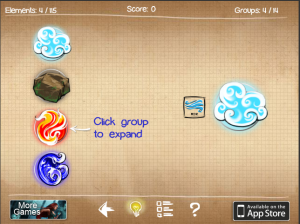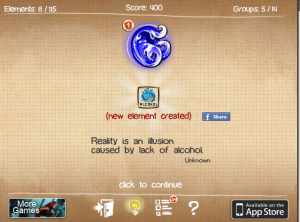Thoughts on Doodle God
Tuesday, July 13th, 2010Recently, I played a game called Doodle God.
It's a simple game, and playable in your browser (assuming you've got a Flash plugin installed), so click the link if you want to check it out. I think you should, but it took me some thought to figure out why I think you should.
Doodle god is a simple game, with a simple (but not unattractive) presentation. Pretty much the whole game looks like this:
What's going on here? You begin with four elements, each in its own group. Here I've selected the air group, with the short tutorial indicating that I should click on the fire group. Doing so would make the left side of the screen look a lot like the right side, but with fire instead of air. I could then select individual elements within the two groups (at this point, I have little choice, fire + air). If they combine (they do), I get a new element (energy), which I can then use in further combinations.
And that's it.
You start with the four base elements, and through combination and experimentation, you reach the end of the game with over 100. Each time you succeed at combining elements, you're greeted with something like this:
 You get your new element(s) and a delightful little quote related to the process, or the result. Some slight fanfare that isn't adequately captured via screenshot occurs, but it isn't anything worth writing about in detail.
You get your new element(s) and a delightful little quote related to the process, or the result. Some slight fanfare that isn't adequately captured via screenshot occurs, but it isn't anything worth writing about in detail.
The question is then, why is this game worth writing about in detail? It does a great job of tackling a key tool in the designer's toolbox: experimentation. Allowing the player to experiment in a controlled way is an excellent way to allow the player to feel as if they have freedom, and then to feel clever when they figure something out.  At the same time, the experimental process is rife with setbacks. A quote attributed to Thomas Edison that gets bandied around often is "I have not failed. I've just found 10000 ways that won't work".  What this means for designers is that experimentation offers a built in ego crutch: failure is less punishing than success is rewarding, which means that if the experimentation is implemented well, the frustration of failure won't drive players away.
Doodle God gets this right; it makes the player feel clever upon finding a neat combo, and provides a hint system that nudges players in the right direction for discoveries without actually doing the discovering automatically. It has a nice feedback loop, in that each success creates more gameplay for the player (in the form of new elements to play with).
That said, it misses out on a key opportunity to combine that experimentation with a more rewarding learning experience. That is, a successful (or failed!) combination doesn't actually provide any new information to the player that can be useful in future interactions. Imagine the situation of a young child playing Pokemon for the first time. They come across a fire Pokemon, like Charmander, and are having a rough time defeating him. So they start swapping their monsters around until they use some sort of water Pokemon (Squirtle), and get the message that the attack was super effective.  The child learns that water attacks are strong against fire (which is basically a given to experienced gamers or firefighters, assuming it isn't an electrical fire). Her experimentation with a variety of Pokemon lead to not only a positive result, but tactical information that can be useful in future battles against fire Pokemon (and indeed, inversely, against water Pokemon).  This is what Doodle God is missing. There isn't any player-knowledge gained from a success, only new gameplay items. While the player learns a particular combination doesn't work in the case of a failure, this provides no additional information beyond "don't bother doing that again", and after playing awhile, it's easy to forget what combinations have been attempted.







